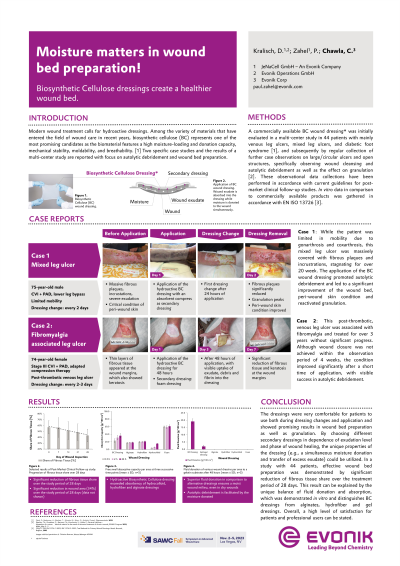Case Series/Study
(CS-088) Moisture matters in wound bed preparation!

Modern wound treatment calls for hydroactive dressings. Among the variety of materials that have entered the field of wound care in recent years, biosynthetic cellulose (BC) represents one of the most promising candidates as the biomaterial features a high moisture-loading and donation capacity, mechanical stability, moldability, and breathability. [1]
Methods:
Commercially available BC wound dressing* has been evaluated in a multi-center study in 44 patients with mainly venous leg ulcers, mixed leg ulcers, and diabetic foot syndrome [1], first, and afterwards by regular gathering of further case observations on large/circular ulcers and exposed anatomical structures [2]. These observational data collections have been performed in accordance with current guidelines for post-market clinical follow-up studies.
Results:
A significant cleansing effect was achieved during application, with a reduction of fibrinoid coatings from approx. 57.1% to 43.1% representing a very good value for autolytic wound cleansing. Wound healing was found to be reactivated in stalling wounds. Irritative manifestations at the wound edges and peri-wound skin decreased significantly during application period. In addition to the palliative properties of the moist dressing, this also demonstrates its excellent tolerability even for pre-existing skin damage.
Discussion:
The dressings were very comfortable for patients to use both during dressing changes and application and showed promising results in wound bed preparation as well as granulation. By choosing different secondary dressings in dependence of exudation level and phase of wound healing, the unique properties of the dressing (e.g., a simultaneous moisture donation and transfer of excess exudate) could be utilized. Rare unpleasant sensations were generally minor in their severity and also decreased significantly over the treatment period.
Overall, a high level of satisfaction for patients and professional users can be stated.
Trademarked Items: epicite®
References: [1] Zahel, P.; Beekmann, U.; Eberlein, T.; Schmitz, M.; Werz, O.; Kralisch, D.; Bacterial Cellulose—Adaptation of a Nature-Identical Material to the Needs of Advanced Chronic Wound Care. Pharmaceuticals 2022, 15, 683.
[2] Eberlein, Th.; Grundtner, P.; Bertram, Ch.; Kruschwitz, S.; Lübke, P.; Bacterial cellulose – Adaptation of a nature-identical material to the needs of advanced treatment of chronic wounds, EWMA Congress 2023, Milan, May 3 - 5

.png)